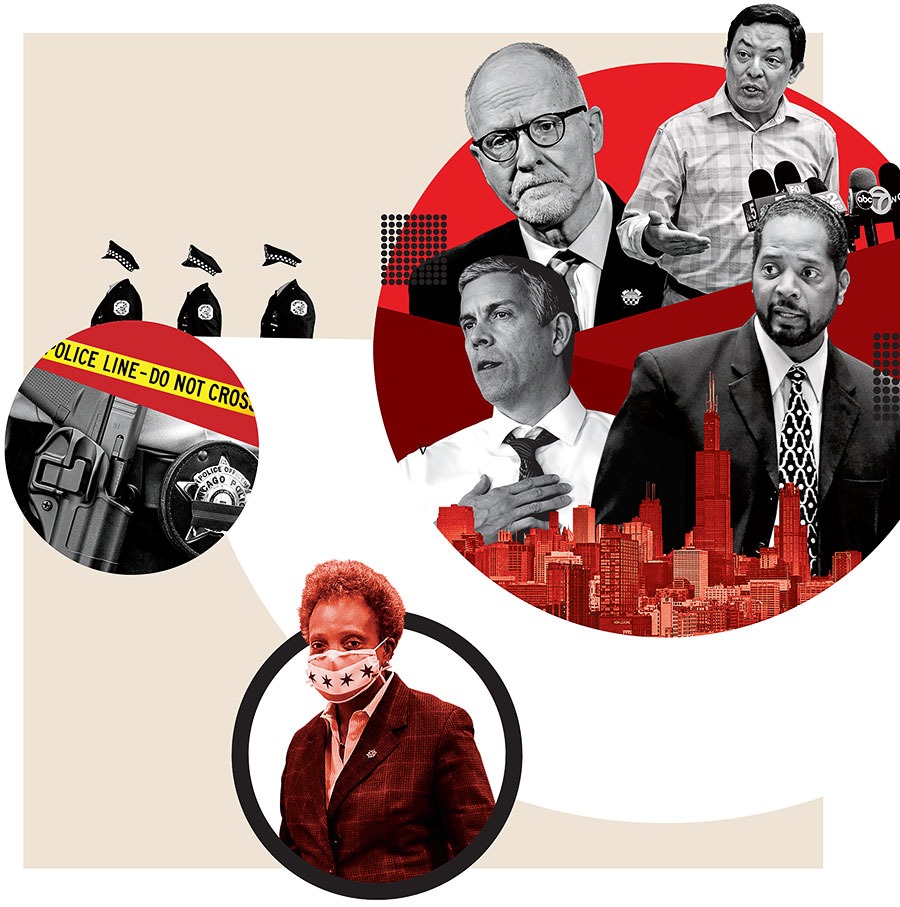After Lori Lightfoot won the 2019 mayoral runoff with 73 percent of the vote, an alderman commented, “Her support is a mile wide and an inch deep.” In other words, she was a candidate for a moment in which voters were fed up with corruption, but she didn’t have a base that would stick by her in a crisis.
That has turned out to be the most prescient assessment of Lightfoot’s political appeal. The world has changed a lot since her election. The COVID-19 pandemic is about to enter its third year, and the city is as violent as it’s been in a quarter century. Chicagoans are exhausted — with life, and with Lightfoot. According to an Ogden & Fry poll conducted for Fox 32 in November, 62 percent don’t believe she deserves reelection. Just a year before the election, Lightfoot looks in danger of becoming the first elected mayor in 40 years not to win a second term.
Lightfoot has been praised for leading the city through the pandemic and for investing in neglected neighborhoods, but crime is causing the city to turn against her. The year before she was elected, there were 547 homicides in Chicago; last year, the total topped 780, the most since the mid-1990s. In the summer of 2020, the Magnificent Mile was trashed and looted twice during protests against police brutality. Carjackings were up 43 percent in 2020, compared with the year before. “One of the major issues she ran on was she’s going to take control of the crime issue,” says Matthew Podgorski, who conducted the Ogden & Fry poll. But now 75 percent of voters disapprove of how she’s handling it.
“She’s definitely in trouble,” says WBGX radio host Maze Jackson. “The No. 1 thing has got to be violence in the city. When people saw downtown go up, that’s where she lost the core of her base, the North Side. Now the same people that elected Lori Lightfoot are the same people that can elect a law-and-order candidate.”
One Lightfoot rival is already trying to occupy that lane: Paul Vallas, who got 5 percent of the vote in 2019, and told Chicago he will consider a mayoral run “if the financial support is there.” Vallas has been attending “Back the Blue” rallies and calling police superintendent David Brown’s antiviolence strategy of dispatching a roving antigang unit to various parts of the city “an epic failure.” The Ogden & Fry poll showed Lightfoot losing to Vallas in a head-to-head matchup. It also showed the mayor losing to former education secretary Arne Duncan, Alderman Raymond Lopez, and Alderman Anthony Beale — all of whom have been discussed as potential candidates.
Lightfoot was elected as a political outsider — a former federal prosecutor who promised to dismantle the system of favors and back-scratching that has given Chicago a reputation as the nation’s most corrupt city. But her appeal as a candidate — a lack of connection to Chicago politics — has turned out to be a weakness as mayor.
Lightfoot’s relationship with the City Council was fraught from the start, when she promised to dismantle aldermanic prerogative. When her proposals pass, it’s often by bare majorities, such as the 29–21 vote on her 2021 budget. Her floor leader, Alderman Gilbert Villegas, quit midterm. Villegas was considered a possible mayoral candidate but is running instead for Congress in the newly created, heavily Latino district on the Northwest Side.
“It’s been a very tumultuous administration that she’s created, not building any bridges as a leader,” says Lopez, the mayor’s prickliest council critic, who believes votes are so close because Lightfoot doesn’t consult with aldermen before bringing measures to the floor. “She didn’t know how to manage expectations. She promised the world to everyone in order to get support. When she became mayor, she didn’t know how to deliver. There are people who are committed to the idea of Lori Lightfoot, and are sticking with her, but in terms of the ability of Lori Lightfoot, many people are looking for a new option.”
Those sticking with Lightfoot include her earliest supporters, who were attracted by her promises of political reform. “The advocates of good government are likely to be satisfied,” says former alderman Dick Simpson, who helped Lightfoot write the ethics platform for her 2019 campaign. “She ended most aspects of aldermanic privilege. She rewrote the ethics ordinance.” Now, with hundreds of millions of dollars to spend from President Joe Biden’s infrastructure bill, “she’s in a surprisingly good position,” says Simpson, who has a decidedly rosy outlook. “If she runs, she’s a favorite.”
Also sticking with Lightfoot is Alderman Scott Waguespack, Lightfoot’s choice to replace the indicted Edward Burke as chair of the Finance Committee. Waguespack praised the mayor for her Invest South/West program, which has committed $1.4 billion to projects in historically disinvested Black and Latino neighborhoods: “If you look at the way she handled the pandemic, and trying to get the economy going after it, I think we’ve done a great job compared to other cities.”
The Ogden & Fry poll showed the mayor has the strongest support in the Black community, where only 49 percent don’t want to see her reelected. One reason for that, says Maze Jackson, is the feeling that “this is probably the last shot to have a Black mayor, because of the declining population.”
It’s possible that Lightfoot could choose to quit after one term, as Atlanta mayor Keisha Lance Bottoms did. Last summer, Lightfoot said a reelection campaign is “not a gimme.”
“It’s way too early for me to be talking about a second term,” the mayor said at a City Hall press conference in November. Then she added, “Let me just remind you Fox News put out a survey in January of 2019, where they had me at 1.9 percent, and as a consequence of that, excluded me from a debate that they hosted. Well, here I am, so consider the source.”




